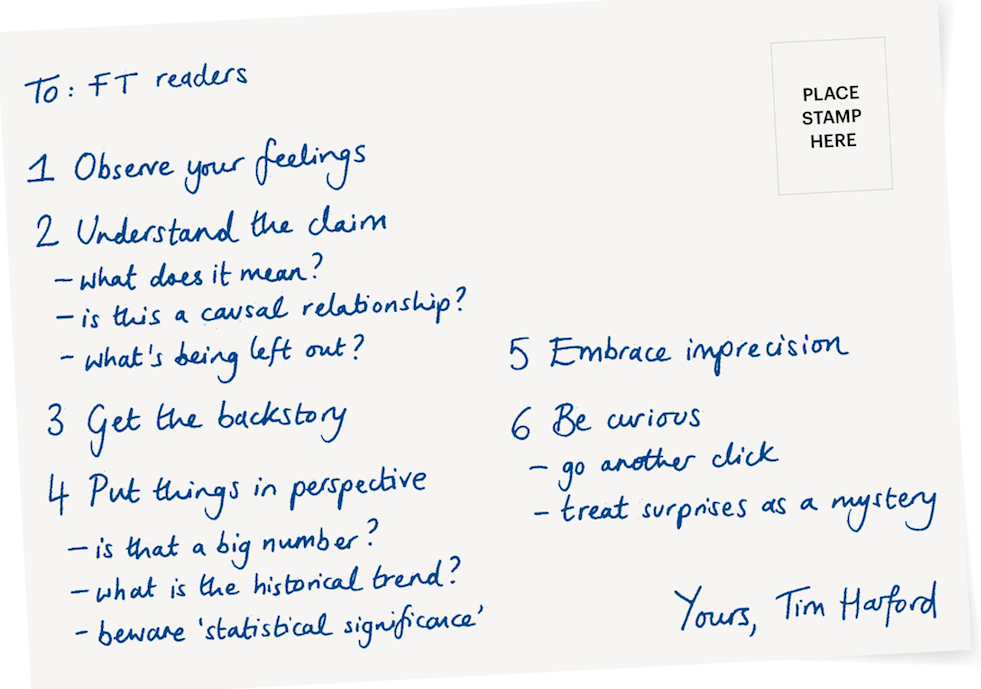Summary:
Guest Post by Jeff Mosenkis of Innovations for Poverty Action. Above, Tim Harfords postcard rules for reading statistics (gated), inspired by Harold Pollack’s personal finance rules index card. ER docs seem to use mental heuristics – patients are more likely to get tested for and diagnosed with a heart attack if they go right after their 40th birthday than right before (job market paper from Stephen Coussens). Dick Thaler’s Nobel Prize-winning Mental Accounting paper was originally rejected by the referees who said it didn’t have enough math. After some careful consultation, the editor overrode them. Oxfam emphatically states that there’s no definitive evidence that the prostitutes hired by their staff in Haiti in the wake of the earthquake were underage. Which is an actual statement
Topics:
Jeff Mosenkis (IPA) considers the following as important: academia, census, Crime, Economics, gender bias, health, heuristics, legitimacy, mental accounting, miscellany, Research, sexual harassment, statistics, thaler
This could be interesting, too:
Guest Post by Jeff Mosenkis of Innovations for Poverty Action. Above, Tim Harfords postcard rules for reading statistics (gated), inspired by Harold Pollack’s personal finance rules index card. ER docs seem to use mental heuristics – patients are more likely to get tested for and diagnosed with a heart attack if they go right after their 40th birthday than right before (job market paper from Stephen Coussens). Dick Thaler’s Nobel Prize-winning Mental Accounting paper was originally rejected by the referees who said it didn’t have enough math. After some careful consultation, the editor overrode them. Oxfam emphatically states that there’s no definitive evidence that the prostitutes hired by their staff in Haiti in the wake of the earthquake were underage. Which is an actual statement
Topics:
Jeff Mosenkis (IPA) considers the following as important: academia, census, Crime, Economics, gender bias, health, heuristics, legitimacy, mental accounting, miscellany, Research, sexual harassment, statistics, thaler
This could be interesting, too:
Lars Pålsson Syll writes Schuldenbremse bye bye
Lars Pålsson Syll writes What’s wrong with economics — a primer
Lars Pålsson Syll writes Krigskeynesianismens återkomst
Lars Pålsson Syll writes Finding Eigenvalues and Eigenvectors (student stuff)
Guest Post by Jeff Mosenkis of Innovations for Poverty Action.
- Above, Tim Harfords postcard rules for reading statistics (gated), inspired by Harold Pollack’s personal finance rules index card.
- ER docs seem to use mental heuristics – patients are more likely to get tested for and diagnosed with a heart attack if they go right after their 40th birthday than right before (job market paper from Stephen Coussens).
- Dick Thaler’s Nobel Prize-winning Mental Accounting paper was originally rejected by the referees who said it didn’t have enough math. After some careful consultation, the editor overrode them.
- Oxfam emphatically states that there’s no definitive evidence that the prostitutes hired by their staff in Haiti in the wake of the earthquake were underage. Which is an actual statement someone in Oxfam’s communication department had to issue after reporters discovered the behavior.
- The National Science Foundation is requiring that universities receiving funding from them report sexual harassment. One potential unintended consequence (as I read the article) is that reporting just upheld findings could just incentivize universities to make reporting harder or quietly dismiss cases even more than they already do.
- Police departments have done similar things – lowered crime statistics by making it harder to report crimes or weakening the description of a crime to a misdemeanor. The LAPD was found to have done this (h/t Elizabeth Pancotti), and NYPD in 2011, 2012, and last month.
- One example: A UK paleontologist explains how she was retaliated against when she filed a sexual harassment claim with her university.
- The census isn’t glamorous to the general public, but it’s really really important, among other things for apportioning Congressional representation. In an opinion piece David Leonhardt summarizes urgent concerns about how new leadership (not subject to Senate approval) and changes in questions and counting methods could rig the results for political benefit.
- You may recall from last week that the U.S. is cutting back on emerging disease surveillance abroad by 80 percent. A investigation finds that a last-line antibiotic (one used when all other fails) is being used by the ton in chicken feed in India and exported to other countries. This allows poultry producers to grow more chicken in crowded and unsanitary conditions, but is begging for a drug-resistant superbug.
- A public service announcement for economists, wherein Dina Pomeranz reminds Josh Angrist that seminar questions can be engaging without being contentious. Michael Kremer always comes up as a role model for asking questions in a supportive way.
- How the great science reporter Ed Yong spent two years trying to fix the gender imbalance in experts he quotes in his stories.
- And everybody’s getting psyched for the new movie coming out to learn how Wakanda aced governance, avoided the resource curse, and developed a healthy tech sector. But the Black Panther will premiere in Kisumu, Kenya, actress Lupita Nyong’o’s hometown before it’s shown in the U.S.

